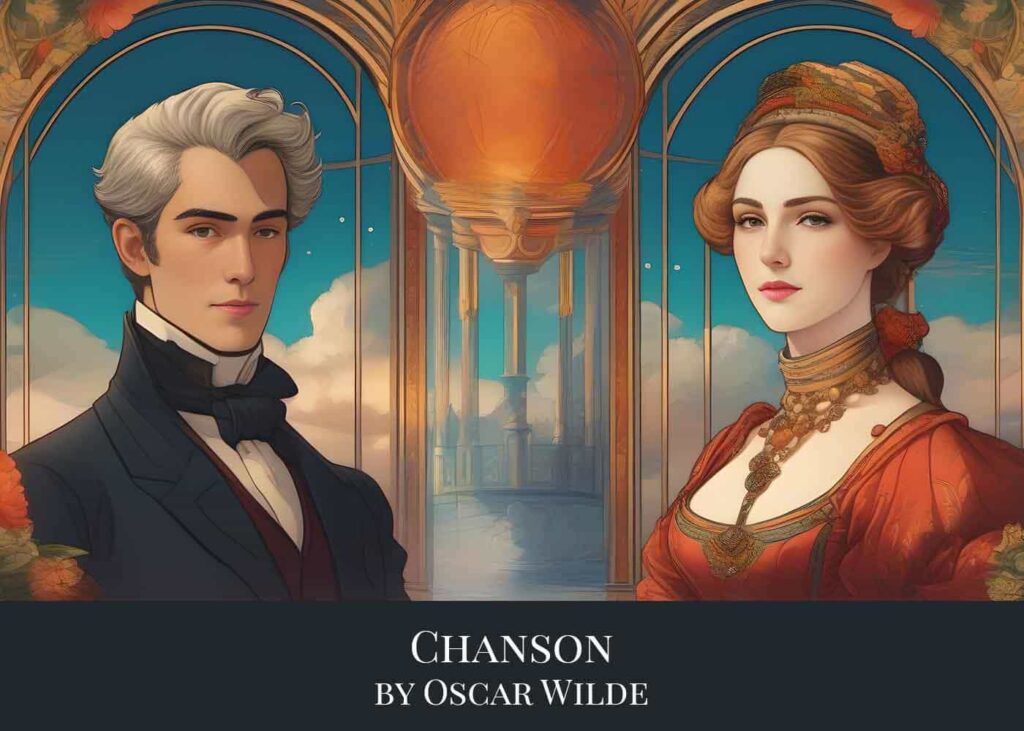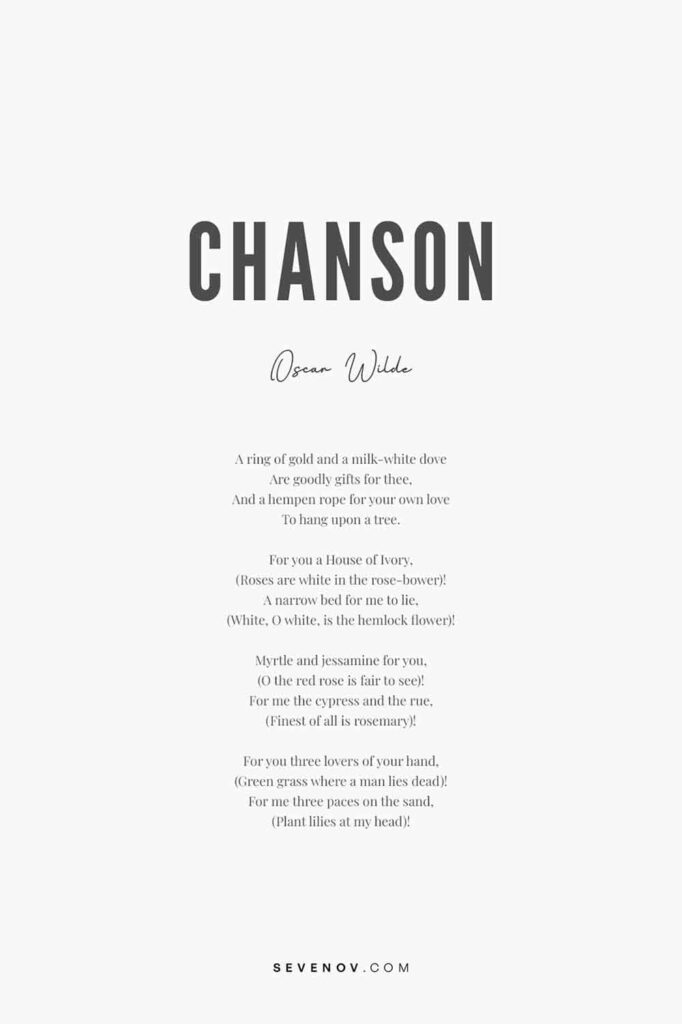
Chanson by Oscar Wilde
Dive into the emotional landscape of Oscar Wilde‘s “Chanson,” a poignant expression of the contrast between joy and sorrow, love and loss, life and death. Wilde crafts a series of juxtapositions that highlight the disparity between the experiences and fates of two people, presumably lovers. This particular poem is included in his poetry volume Poems. For readers eager to explore the depths of Wilde’s poetic expressions, the online book Poems can be found at PageVio
1. The Poem
A ring of gold and a milk-white dove
Are goodly gifts for thee,
And a hempen rope for your own love
To hang upon a tree.
For you a House of Ivory,
(Roses are white in the rose-bower)!
A narrow bed for me to lie,
(White, O white, is the hemlock flower)!
Myrtle and jessamine for you,
(O the red rose is fair to see)!
For me the cypress and the rue,
(Finest of all is rosemary)!
For you three lovers of your hand,
(Green grass where a man lies dead)!
For me three paces on the sand,
(Plant lilies at my head)!

Size: 8″ x 12″ (2:3 ratio)
Format: PDF
Copyright information: For personal use only
Note: Actual poster background color is white. For the sample poster, the background is made gray for illustration purpose.
2. Chanson Analysis
This poem, rich with symbolism and contrasting imagery, seems to present a narrative of unrequited love or a tragic romantic relationship. Each stanza juxtaposes what the speaker envisions or wishes for their beloved with what they foresee for themselves, often with a morbid or fatalistic undertone.
A ring of gold and a milk-white dove / Are goodly gifts for thee,
This line suggests traditional symbols of purity and commitment, perhaps referencing marriage or true love offered to the beloved.
And a hempen rope for your own love / To hang upon a tree.
This line introduces a starkly contrasting image, implying execution or suicide for the speaker’s own love, perhaps suggesting the fate of their love or their own demise due to unrequited feelings.
For you a House of Ivory, / (Roses are white in the rose-bower)!
The house of ivory signifies wealth and beauty for the beloved, while the reference to white roses may symbolize innocence and purity.
A narrow bed for me to lie, / (White, O white, is the hemlock flower)!
The narrow bed might be a grave, and hemlock, a poisonous plant, symbolizes death. The speaker seems to say while the beloved lives a life of splendor, they themselves are fated to die, possibly of a broken heart.
Myrtle and jessamine for you, / (O the red rose is fair to see)!
These are fragrant, beautiful flowers, further painting a life of beauty and pleasure for the beloved, with the red rose often symbolizing love or passion.
For me the cypress and the rue, / (Finest of all is rosemary)!
Cypress trees are often associated with mourning and cemeteries, while rue can represent regret or sorrow. Rosemary, although it is associated with remembrance and therefore love, is also used in funerals, reinforcing themes of death and mourning for the speaker.
For you three lovers of your hand, / (Green grass where a man lies dead)!
This line suggests that the beloved will have suitors or actual lovers, contrasted with the image of a grave (“green grass where a man lies dead”), possibly the speaker’s own.
For me three paces on the sand, / (Plant lilies at my head)!
The speaker, in contrast, foresees a lonely journey, “three paces on the sand” suggesting a brief and transient existence, followed by death where lilies, flowers often associated with funerals, should be planted at their head.
Overall, the poem is rich in metaphors for love, death, and possibly unrequited affection. It has a haunting quality, as the speaker seems to accept a grim fate while wishing or acknowledging a brighter future for their beloved. The poem’s use of parentheses might imply these are thoughts unspoken, reinforcing the theme of internal suffering and silent adoration.
Conclusion
Should you enjoy “Chanson,” you might consider exploring other poems penned by Oscar Wilde.




